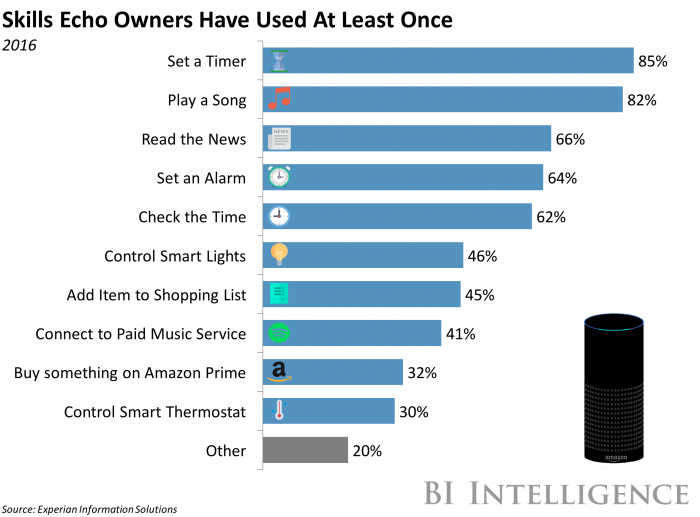Amazon has added even more useful skills to Alexa

(BII)
This story was delivered to BI Intelligence IoT Briefing subscribers. To learn more and subscribe, please click here.
Amazon recently added two notable new skills to its Alexa voice assistant along with expanded news coverage, increasing its offerings to over 3,000 total skills and counting.
MLB Audio is coming to Alexa-compatible devices just in time for the start of the World Series, reports TechCrunch. This means that subscribers to MLB products can ask Alexa to play their favorite team, and the device will turn on the local radio play-by-play of the specified team.
The Logitech Harmony skill brings voice control to users' home theater systems,according to TechCrunch. The skill allows users to begin any activity that they have registered with their Harmony smart home hub, including entertainment devices such as smart TVs and home theater systems. For example, a user can simply say “Alexa, turn on Netflix,” and it will bring the streaming service up on the user’s TV.
CNN recently announced that it will be bringing its individual hosts and its larger news capabilities to Alexa. The media giant has long relied on the brand recognition of many of its hosts, such as Anderson Cooper, John King, or Wolf Blitzer, and this will only enhance this. This means that users can ask Alexa either for general news on a given subject area, a specific anchor, such as Cooper, or the latest breaking news.
Alexa is catching growing attention from mainstream content producers. The popular voice assistant has been popular with consumers since its inception, but only in the last year has Amazon added a large number of skills to it. Further, the Echo and Alexa have become a platform for Amazon to sell Prime products via voice ordering, creating a huge revenue stream for the world’s largest online retailer.
The company has expanded this revenue stream by introducing the new, less expensive Echo Dot, thereby expanding its overall addressable market for the device. Overall, BI Intelligence expects that the voice-activated personal speakers will become a key platform for tech companies to enhance their core businesses.
There are several challenges for companies taking this approach, however, because the U.S. smart home market has yet to truly take off. Quirky's announcement that it was filing chapter 11 bankruptcy — and selling off its smart home business, Wink — highlights this well.
At its current state, we believe the smart home market is stuck in the 'chasm' of the technology adoption curve, in which it is struggling to surpass the early-adopter phase and move to the mass-market phase of adoption.
There are many barriers preventing mass-market smart home adoption: high device prices, limited consumer demand and long device replacement cycles. However, the largest barrier is the technological fragmentation of the smart home ecosystem, in which consumers need multiple networking devices, apps and more to build and run their smart home.
John Greenough, senior research analyst for BI Intelligence, Business Insider's premium research service, has compiled a detailed report on the U.S. smart home market that analyzes current consumer demand for the smart home and barriers to widespread adoption. It also analyzes and determines areas of growth and ways to overcome barriers.
Here are some key takeaways from the report:
Smart home devices are becoming more prevalent throughout the US. We define a smart home device as any stand-alone object found in the home that is connected to the internet, can be either monitored or controlled from a remote location, and has a noncomputing primary function. Multiple smart home devices within a single home form the basis of a smart home ecosystem.
Currently, the US smart home market as a whole is in the "chasm" of the tech adoption curve. The chasm is the crucial stage between the early-adopter phase and the mass-market phase, in which manufacturers need to prove a need for their devices.
High prices, coupled with limited consumer demand and long device replacement cycles, are three of the four top barriers preventing the smart home market from moving from the early-adopter stage to the mass-market stage. For example, mass-market consumers will likely wait until their device is broken to replace it. Then they will compare a nonconnected and connected product to see if the benefits make up for the price differential.
The largest barrier is technological fragmentation within the connected home ecosystem. Currently, there are many networks, standards, and devices being used to connect the smart home, creating interoperability problems and making it confusing for the consumer to set up and control multiple devices. Until interoperability is solved, consumers will have difficulty choosing smart home devices and systems.
"Closed ecosystems" are the short-term solution to technological fragmentation. Closed ecosystems are composed of devices that are compatible with each other and which can be controlled through a single point.
In full, the report:
Analyzes the demand of US consumers, based off of survey results
Forecasts out smart home device growth until 2020
Determines the current leaders in the market
Explains how the connected home ecosystem works
Examines how Apple and Google will play a major role in the development of the smart home
Some of the companies mentioned in this report include Apple, Google, Nest, August, ADT, Comcast, AT&T, Time Warner Cable, Lowe's, and Honeywell.
To get your copy of this invaluable guide, choose one of these options:
Subscribe to an ALL-ACCESS Membership with BI Intelligence and gain immediate access to this report AND over 100 other expertly researched deep-dive reports, subscriptions to all of our daily newsletters, and much more. >> START A MEMBERSHIP
Purchase the report and download it immediately from our research store. >> BUY THE REPORT
The choice is yours. But however you decide to acquire this report, you’ve given yourself a powerful advantage in your understanding of the smart home market.
More From Business Insider

 Yahoo Finance
Yahoo Finance 
